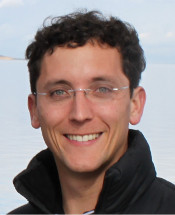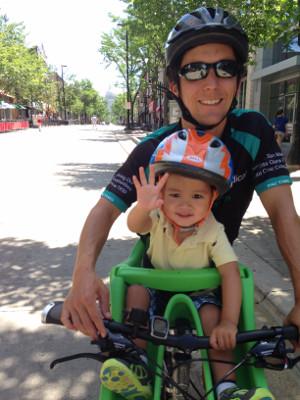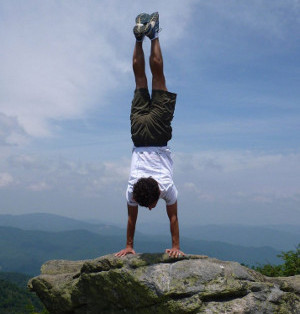Wes Culberson
Assistant Professor
Family?
I live with my wife, Jessica, and our son, Matthew. Matthew is three and a half years old now, and he’s from China. We’re in the process of adopting a second child from China next year, so we’re really excited about that.

Hobbies/downtime activities?
I have a lot of hobbies. Near the top are woodworking, sailing, general outdoor activities like camping with family, running now I’m getting into a little mountain biking. These days I’m simply trying to focus on the woodworking hobby and finishing projects around the house.
Wes Culberson precariously practicing his gymnastics
What books are at your bedside?
I have two books right now on my bedside table. One of them is a new Stephen King book on JFK called 11/22/63. It’s supposed to be very good, but I just started it. The second book is called The Poisonwood Bible by Barbara Kingsolver. I’m almost finished with that one and it’s great.
What is at the top of your bucket list?
Probably at the top of my bucket list is to live on a sailboat for a long time. Maybe go buy a sailboat in the Mediterranean or the Caribbean and live there for six months or so. I might not be able to do that until retirement, but that’s on the bucket list!
If given a chance, who would you like to be for a day?
I would like to be a 747 jumbo jet pilot for a day. It’s always been my kind of secret alternative career aspiration that I never even got close to. I’ve just always wanted to fly an airplane; it sounds really fun.
In the Spotlight
Can you introduce yourself?
I am originally from a small town in Tennessee called Johnson City. I earned my Ph.D. in 2006 under the direction of Professor Larry DeWerd—who actually is in the office next to me now! I graduated with the intention of being a clinical physicist for the rest of my life and was employed as such for seven years. I came back to the UW in 2013, and have been here for three years on the clinical professor track.
What attracted you to the field of medical physics?
In college I thought that I was going to be an engineer. I liked the application of physics and math and high-tech technology. I also liked hands-on experiments, creating things and doing measurements. During my junior year at Furman University I was able to shadow a radiotherapy medical physicist in their clinic as a part of a school-sponsored internship program. I was able to see a cancer department that was progressive and high-tech. There were accelerators used to treat cancer patients and the lasers in the wall looked fantastic. All I could think was, “This sounds great! I want to pursue a career in medical physics.” So, from then on I was pretty excited about it.
What is your role in the department?
I have a few roles. Primarily I’m an educator. I am also heavily involved in a research program in the Radiation Calibration Lab with Professor DeWerd. This year I became director of the ADCL portion of the lab—that’s the Accredited Dosimetry Calibration Lab—so as a part of that I manage staff, help establish new services and participate on AAPM committees.
I’m also doing a lot of mentoring graduate students. We have fourteen students in the lab right now. Six of them are students who I advise directly. I’m also on the Ph.D. committee of another ten or eleven students.
I teach some courses that are for outside attendees. These are linac calibration and commissioning courses and we just started a new one for small field dosimetry. We’ve gotten a very good response; we just had our eighth course and our next two courses are filling up.
What aspects of your roles do you enjoy most?
The aspects that are probably the most enjoyable are interacting with the students—it’s really fun to interact with them and all of their energy. Also, whenever we make a new discovery, that’s another time that is really enjoyable.
How has the field of Medical Physics and radiation research evolved since you started and where do you see it going in the future?
Well, I only have a fifteen-year perspective on the field of medical physics, so this is all with a grain of salt. Fifteen years ago technology was growing at a rapid race and everyone was trying to keep up. Technology was growing for both radiotherapy and diagnostic imagine. I remember a lot of fellow graduate students being offered a lot of jobs; there just weren’t enough medical physicists to go around. Now, I think the technology is still growing, and that’s one of my favorite parts about it, but I think that pace has started to slow down a bit on the technology side; what we’re seeing now is a lot more integration with biology on both the therapy and diagnostic imaging side.
What challenges have you faced in your career?
I think one of the hardest challenges was moving out of the 100% clinical world into the 100% academic world. As an academic I was worried about feeling isolated from the clinical world. Thankfully, that has not been the case and I continue to work with our clinical partners next door in the Department of Human Oncology. It was also difficult to transition careers from an employer that largely thrives on the business of medicine and making money to an academic environment that is based on scientific innovation and educational pursuits.
What is the best advice you ever received?
I have to give Professor DeWerd some credit for giving me some of the best advice. When I was a graduate student—and to this day—his advice is to not just act as technicians, to not just press the buttons, but to really think critically about a problem and how to solve it.
Do you have any advice for students?
I think that being a graduate student is certainly not an easy time in your life. Our students are rigorously tested academically and are faced with setbacks that may cause them to redo major portions of their projects. It can be frustrating and stressful. My advice is for them to take a step back occasionally and enjoy some of the flexibility and freedom they have as a graduate student and to get to know their graduate student schoolmates. I know that the friendships that I formed in grad school are some of the strongest that I’ve ever had and still treasure to this day.
What is your favorite part of teaching and being a mentor to students?
I like to see the students growing and hitting milestones. It feels a little incremental while they’re here, but there’s really a big difference from when they come in the door and when they leave—in their writing abilities, in their research abilities—and seeing them achieve these things brings me great pleasure. And then, I like to see them succeed after they leave!


